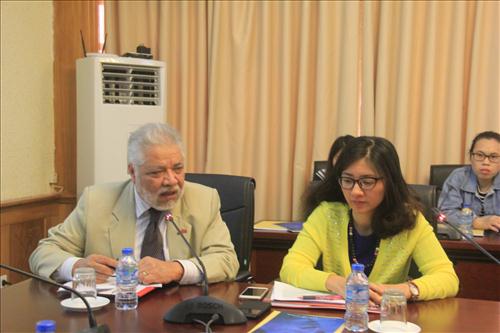
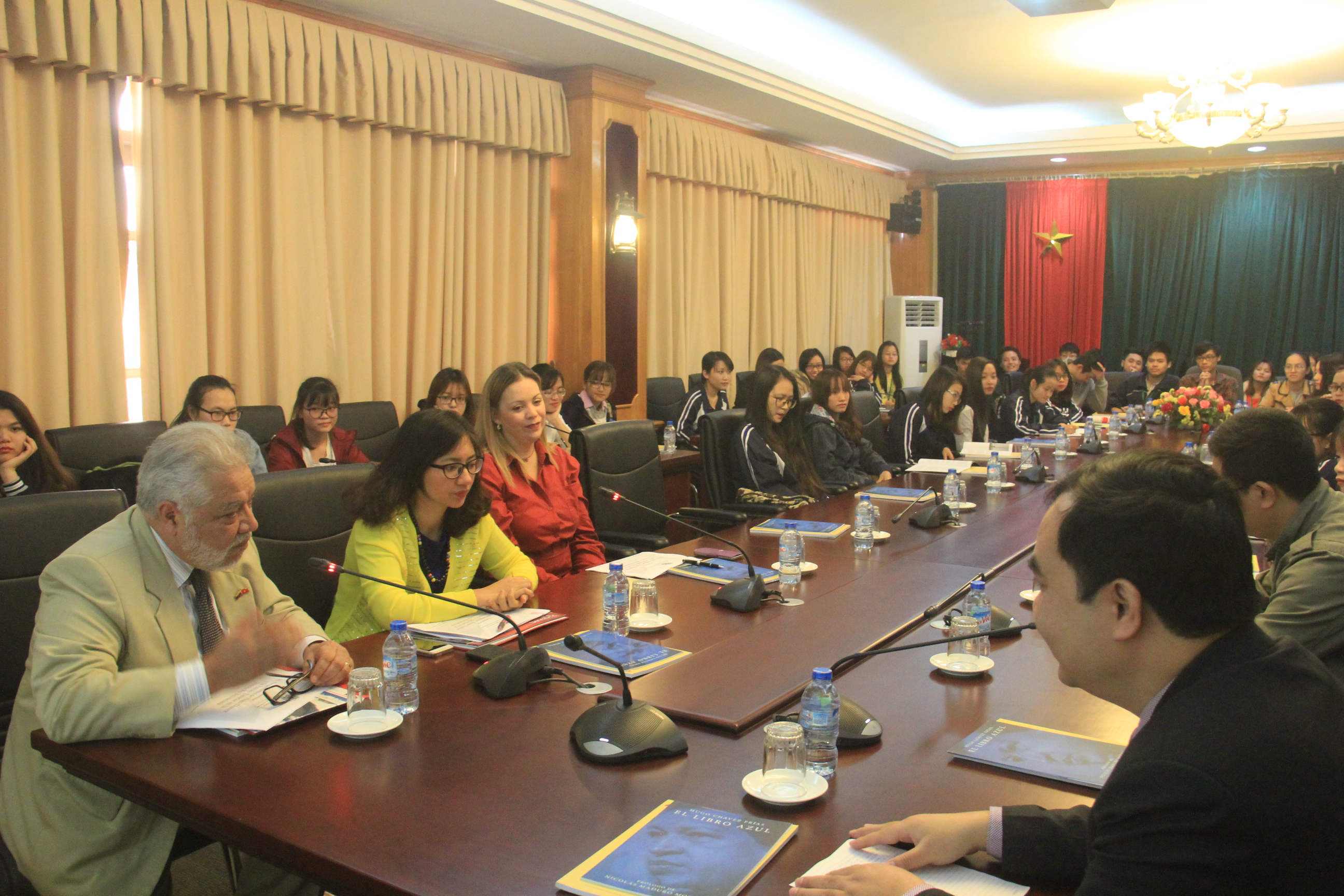
At the beginning of his presentation, Ambassador Jorge Rondon Uzcategui presented the context of Venezuela when Hugo Chávez began his career. From 1958 to 1993, Venezuela experienced a deep economic and social crisis in the 1980s. Unemployment and poverty increased, the state failed to meet the basic needs of the people, corruption was serious, causing the country to fall into the hands of transnational corporations, the International Monetary Fund, the World Bank... At that time, Hugo Chávez stood up to successfully carry out the military uprising in 1992 and became the leader of the Bolivarian revolution. With strong popular support, he won the elections in December 1996 with the Bolivarian Plan: determined to promote the constitutional process, re-establish the state, empower the people, promote democracy, promote poverty reduction and social inclusion.
The Bolivarian Plan has left behind many important achievements for Venezuela such as reducing inequality by 54% (based on the GINI coefficient), reducing poverty from 70.8% (1996) to 21% (2010), reducing unemployment from 11.3% to 5.5%, reducing malnutrition to 5% and achieving a high human development index of 0.764. Venezuela is also recognized by UNESCO as the fifth country in the world in terms of the number of university students, with an increase from 28% in 1999 to 86.2% today.
The success of the Bolivarian Revolution was greatly contributed by Hugo Chávez's political ideology. This ideology was inspired by Simón Bolivar's advocacy of equality, freedom and Latin American integration, Simón Rodriguez's progressive ideology and popular education and Ézequiel Zamora's advocacy of military-civilian solidarity for justice. In particular, Hugo Chávez's 21st Century Socialism doctrine changed the perception of the Venezuelan and Latin American people, changing their national identity. For him, the history of Venezuela showed that an oil-rich country could not develop through the capitalist path, but through the solidarity of struggle, fighting and victory of the revolution. Chávez's anti-imperialist stance was strongly expressed after the April 2002 Coup. Chávez successfully re-promoted and interwoven democratic and socialist contents, creating the first bricks of the National Independence and Socialist Homeland Plan for the period 2013-2018.
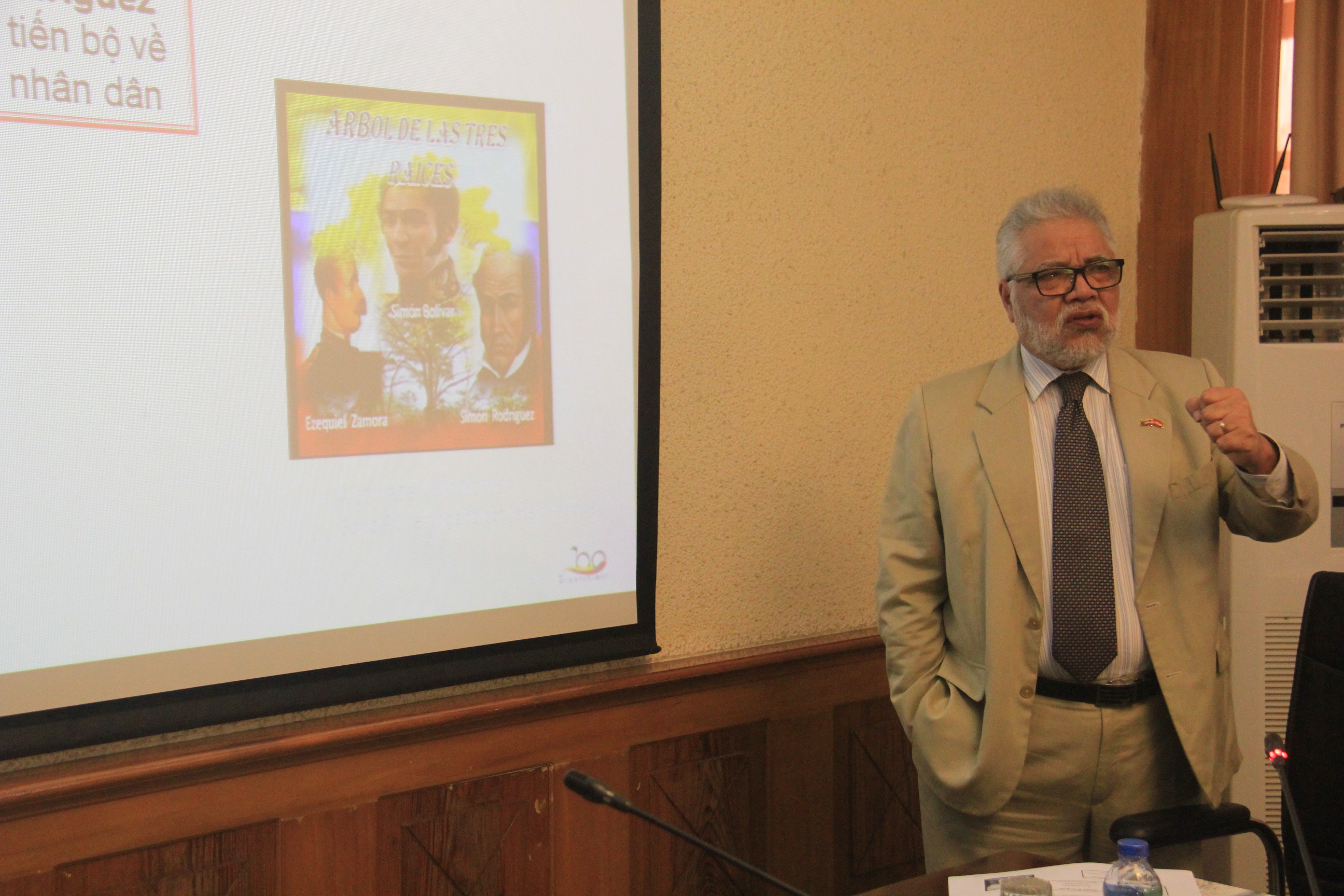
Ambassador Jorge Rondon Uzcategui introduces the ideology of Hugo Chávez
In international affairs, Chávez advocated the restoration of the Bolivarian ideology, the sense of patriotism and integration of the American peoples, and the fight against imperialism through a multipolar relationship between fraternal peoples. His approach helped Venezuela integrate with Latin America and the Caribbean, contributing to the establishment of organizations such as PETROCARB, the Bolivarian Alliance for the Peoples of the Americas (ALBA), the Community of Latin American and Caribbean States (CELAC), etc. In addition, Venezuela's foreign policy also affected Africa, re-energizing the activities of the Organization of the Petroleum Exporting Countries (OPEC). Venezuela also strengthened the agreements signed in many areas on all five continents.
As for Vietnam, Venezuela officially established diplomatic relations in December 1988. In January 2006, the Venezuelan Embassy was established in Vietnam. On July 31, 2008, President Hugo Chávez officially visited Vietnam, paving the way for cooperation opportunities. In September 2015, President Nicolas Maduro visited Vietnam to re-promote projects between the two countries. The two sides signed 46 bilateral agreements, including agreements on cooperation in Oil and Gas, Industry, Electric Energy, Agriculture, Education and Information. The spirit of solidarity between the two countries has always been strengthened through the people's struggle for independence and the construction of socialism with the guiding principle of justice and social equality.
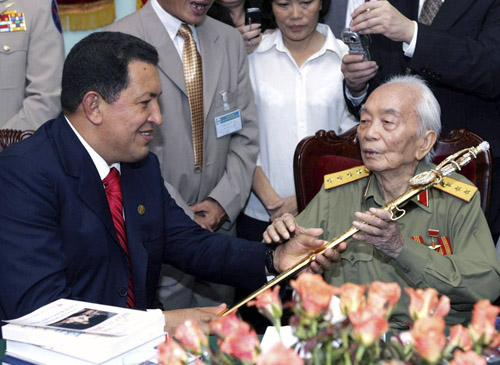
Hugo Chavez presented General Vo Nguyen Giap with a version of the hero Simon Bolivar's sword during his visit on August 1, 2006.
The presentation received a lot of attention and positive feedback from the audience in the auditorium. On behalf of the University of Social Sciences and Humanities, Associate Professor Dr. Tran Viet Nghia expressed his thanks to Ambassador Jorge Rondon Uzcategui in particular and the Venezuelan Embassy in Vietnam in general and hoped that in the future, the two sides would continue to organize practical and useful exchanges and knowledge sharing sessions. The school also hopes that the Venezuelan Embassy will always be a solid bridge between the two sides and between Vietnam and Venezuela in general.
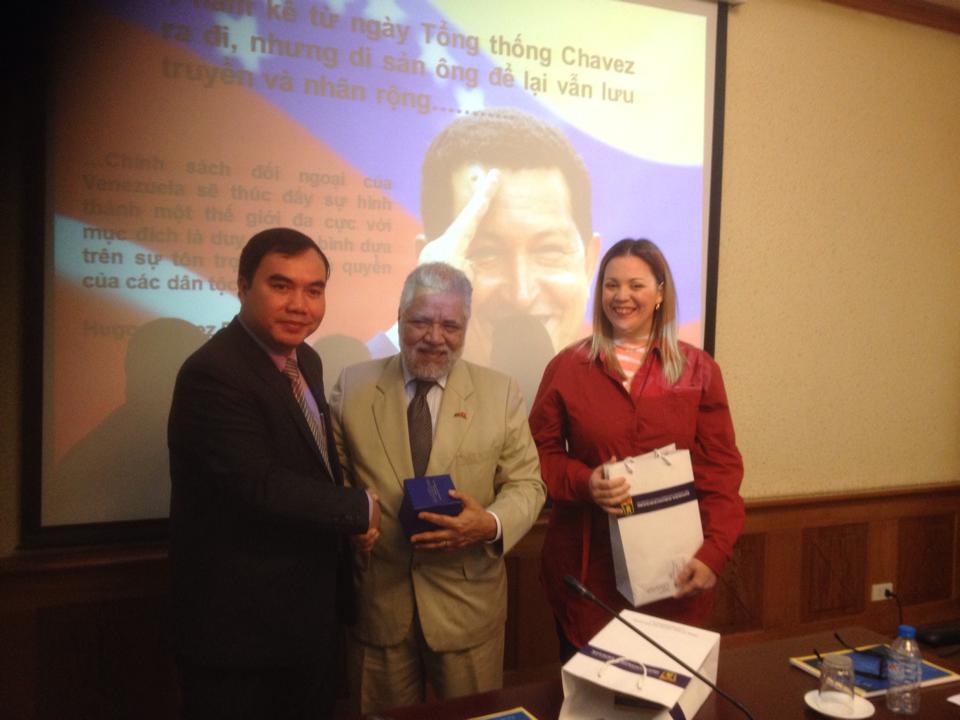
Associate Professor, Dr. Tran Viet Nghia (Head of Cooperation and Development Department) presented a souvenir to Ambassador Rondon Uzcategui
| Hugo Chávez Frias (July 28, 1954 – March 5, 2013) was born in the state of Barinas and was a leader, strategist with a global vision and a love for peace. He pursued a military career and reached the rank of lieutenant colonel by the time he led the military uprising in 1992. He was first elected president in 1998 and re-elected in 2000. In 2002, the opposition staged a coup to oust him, but less than 48 hours later, Mr. Chavez returned to power with the support of the majority of the military and the people. Hugo Chavez became one of the most enduring and prominent leaders in the modern history of Latin America. Hugo Chávez's most prominent work is the Green Book, a document with ideas on the Government project, on the socio-economic structure of a new state model, through the form of an outline of a three-rooted ideological tree: Bolivar, Robinson and Zamora. |
Author:Tran Minh
Newer news
Older news